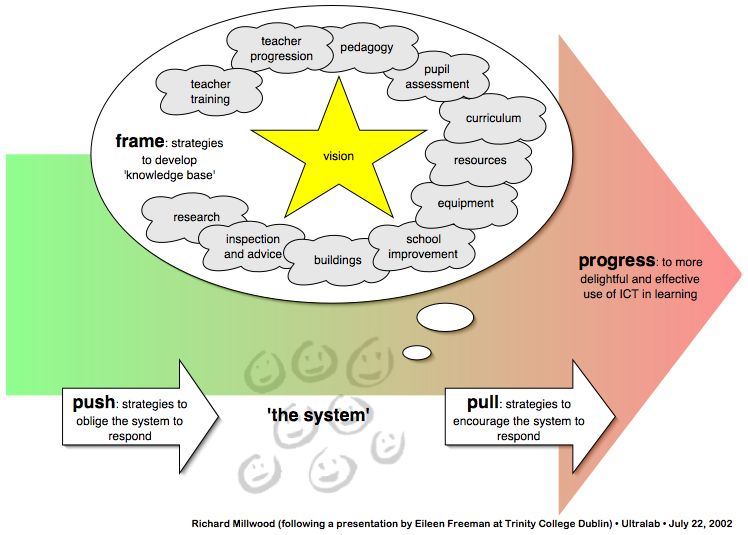All portfolio items
Stanley Academy Conference
| When | Nov 22, 2002 |
|---|---|
| Where | Effingham |
(Words: 19 )
[C18] Ultraversity Project
| When |
Jan 01, 2003
to
Dec 31, 2006 |
|---|---|
| Where | Chelmsford, Essex |
Aim: To design and develop a new work-focussed online university experience to suit 'those for whom traditional university did not fit'.
Reflection: Through this project I consolidated my knowledge and developed new ideas for course design, modular frameworks, online community of practice, action inquiry as a pedagogic model and assessment through patchwork media and exhibition. I also helped developed concepts of business model & operational thinking, and as such it was the closest to the design of a new higher education institution that I had engaged in. I consider it to be the most significant project of all my experience, in that it successfully empowered many hundreds of students in meaningful and effective ways, delivering on the promise of technology enhanced learning.
Contribution: Initially, as part of a small team, I developed the documents for validation and designed strategy and materials for recruitment in 2003. I then had oversight of the direction of the Ultraversity Project in my role as Head of Ultralab from 2005 to 2007. I frequently took a practical developmental role, creating and designing resources, infrastructure, marketing, research and team collaboration as well as a refining a theoretical stance to champion the values and philosophy of the project. My part: 20% (with Stephen Heppell, Stephen Powell and many others)
Originality, impact and importance: This project combined unique elements into a completely new undergraduate opportunity. Its impact was felt deeply on the student's lives and on the researchers who made it possible. It influenced a wider academic community that drew inspiration from its success, and continues to be the subject of much interest today as well as a current course at Anglia Ruskin University. Its importance was recognised by newspapers, government ministers at the time and by organisations such as the Centre for Recording Achievement, who invited me to keynote at their conference to celebrate 10 years of the patchwork text.

Ultraversity was a new fully online work- focussed degree employing multiple innovations, with a curriculum and pedagogy created by a small team and further developed and delivered by a 20 strong team for which I had oversight as line-manager to the director. 144 students graduated in 2006, almost half with first-class honours degrees.
As well as developing a new experience for students, the project developed managerial, operational and team-teaching methods with a geographically distributed group of lecturers using its own online community of practice.
It was the subject of many conference presentations and publications and led to the invitation to create the Inter-Disciplinary Inquiry-Based Learning project at the University of Bolton in 2007.
But a real feel for its impact and unique features may be gained by listening to the students themselves - this video was filmed by Andrew Wood and Robin Cusick at the first major graduation event in November 2006. Together with Greta Mladenova, I transcribed and added text tracks for a transcript and for chapters for navigation:
The complete transcript of the movie is below:
Eve Thirkle & Sharon Sweeney
Hi Eve, I'm Sharon, at last we get to meet.
Yes I've seen your name many times, but, not met.
I can't believe we're here, it's been, well getting to this stage, a total of three and a half years
Yes, it has been, hasn't it.
That first year doing our first assignment, I never thought I'd be here.
The first Christmas was dreadful, because I was up to all hours thinking 'oooh' why have I chosen to do this?
But it's been fantastic.
Well the opportunities I think it's now actually given me I've not realised until now,
how much it has actually changed things,
how when I look at my old job and things, and different things, then everything is so different.
You're ICT aren't you?
I do ICT and I'm now doing High Level TA
and doing other, I seem to be being pulled to doing other support things this time
it's opened quite a few doors, that I would never have had opened without it
and doing other distance learning, this has been so much more supportive in comparison
The community has been fantastic, hasn't it.
I wouldn't have survived without people like yourself
Oh, thank you!
and staff here, especially in the first year I found it really tough on different things and stuff
but people like yourself kept us going and stuff and it became a team
and although we never met, I think we're actually stronger as a team.
We know each other, but we've never met and it's weird.
And you could mention about fun things, and we did have some fun online with different things and stuff
The celebration on the last night was quite funny as well
That was good wasn't it
We had like a party online.
Well for me it hasn't done so much in job, though, obviously because I'm a parent
But it's made a difference in the way I look at what I do as a parent
and it's always there in the back of my mind, sort of, "ah I'm doing that"
and then I start to think "ah yes", and it's putting that reflection into practice is amazing
and makes quite a difference.
You get a sense of achievement, and when I looked at my first work, and how it was put together
and look in comparison at the end
I know
You realise that you can still learn more, you can take on more roles
I think the way it works gradually, you weren't given more than you could handle at the start
although it seemed like it sometimes
and then to the work that you produce in year three, it's amazing growth
When we went through today and got the gowns and I was getting the gown on
this gentleman Les who put the gown on me, as he was putting it on I was flooding with tears
I knew not to wear make up, because it just meant so much
the idea was, you know, I would love to have had a degree in earlier life, and never got the chance
Same here
and then to do this has just been amazing
and to see the other people and now we're all going round looking at names and different stuff
but I'm finding that its actually making contact, because I've met up with a few other people through other things in education now
Yeah, Well I came straight up the stairs here from reception, saw Glenda and went 'haaa'!
Because it's so great to sort of see the faces, see them in person, it's great
I think sometimes as well, we some of us did put our pictures up, but then we get to here, em
You forget, yeah
I was thinking about my group, that we actually worked in a small group, and I knew their names off by heart
and I've got here today, and I can't think of them, its awful
so I'm sort of looking, but I know the names will trigger
Yeah, yeah once you see them
It's just unbelievable to be here.
And we've got that walk across to get our certificates
I know, I've got, I've had to get new glasses since doing this
because I've actually found my eyesight's sort of being going with age a bit
but I'm not wearing my varifocals today because I'll be tripping up the stairs and different stuff
the actual meeting people and stuff has given me the confidence to now go and do more
and why can't I? and why, you know, it has to be a really good reason why I can't do something now
I found school and things are asking me for things about autism and things, because obviously that's what I've gone into
and the head the other week asked me something about that she didn't actually know
and I could inform her on it, which was brilliant
And when I did my exhibition it was quite interesting when I had some of the like parents coming in
and some who were graduates and stuff
and they'd done a small part about reflection in their degree, and the research a small part
they said "You've done your whole degree through that, how did you manage it?"
I said well, we did!
It's a fantastic tool to actually have
For me, it has had an effect on the school through my research, through the project I did
We have changed some of the things we're doing now
and you think, "I did that!"
I'm going to actually see if I can follow it through a bit more
I don't know what I'm going to do next
but look just to see how that has affected the learning
Next step masters?
Well I think no at first and my husband said no
My husband said no as well
I wondered how I fitted in the time, but everyone says I would find that time again
I think I would, because the rewards I have personally got out of it, it's worth it for me, if nothing else.
It would repay our family if I went on and did work on autism as well, so...
OK, thank you very much.
Manisa Atool Saujani & Carole Bateman
I have been a teaching assistant for about 12 years
Yes, the same as me.
12 years is a long time to be a teaching assistant.
When you see that you do a lot better job than some supply teachers that the school bring in
So, that is what I started off with.
Having said that, now that I've done the degree, I do not want to go into teaching.
Too much hard work, too much paperwork
Yes.
But, I'd say it's had an impact on my workplace.
What school do you go to?
I was a senior teaching asistant in an autistic school for autistic children when I finished my degree.
and as a result of it, I was given an unqualified teachers' post
so I was employed to teach, even though I wasn't a qualified teacher.
And plan activities: take the pupils out and do things.
But now, since I've qualified, I've been accepted onto the graduate teacher programme
and I'm training as a primary school teacher
I work in a primary. With Key Stage 1, 2?
I'm with Key Stage 2 at the moment but after Christmas, I'll be with Key Stage 1.
Prefer Key Stage 1? Teaching primary? Or Key Stage 2?
I like them both actually. Because they are slightly different, aren't they.
But I think I like the older ones more.
Well I did, as part of the degree we did the exhibition, the final exhibition
senior management team saw me as an organiser, somebody who can work ICT
so what they've decided to put me into is Learning Resource Centre at the Primary School.
so I'm now looking after the Library and the learning resources for the school, which is quite a big impact.
I'm sure if I'd just done teaching assistant, I will still be a teaching assistant.
But it's done. Gone that far.
Through the degree then you've been able to show them that you're more than just a teaching assistant,
You've got more skills, than just
and you can go around and say "Now I am a graduate." Got the piece of paper that says I am a graduate,
which was what was stopping me from being a, becoming a teacher in the first place.
The thing is, with becoming a teacher now, it's becoming more challenging
because you now you need literacy, numeracy and science at GCSE level,
which I'm OK with literacy and numeracy, science is not my subject
so, maybe
maybe in the future
in the future, maybe. I might go to take GCSE in Biology or something and then do it
we could do it before now
yes but now they have changed...
but the Age Discrimination Act came from 1st October, so everybody has to have a GCSE in Science now.
Sally Houghton & Helen Smith
OK. Several of my research projects were obviously based at work,
but my last one was about introducing new strategies to reduce barriers to enable in life style interventions groups
and as a result of that, there's lots of changes that were made to the sessions
and I learnt a huge amount about running focus groups
and I think it was good because it involved genuine consultation with the patients and they felt they'd been listened to as well
and the actual changes every single suggestion that they made and intervention was based on what they'd had to say about it.
So then they were able to see, so I think it just restores a bit of faith really in that proper patient-public involvement
yeah, it was really good, though that it was work-based, wasn't it and you could do
because I managed to tie mine into a big project I was doing at work anyway,
so the fact that I could tie it in, meant it was easier for me to do and I could justify doing some of it in work time as well.
But I did a piece about NVQs and quality assurance and trying to tie in the impact that training has on service.
so I mean, it kind, there are some long term effects, I think
around the fact that everybody became a lot more aware about evaluating training
rather than just saying whether it was good or bad or indifferent.
and about actually what the difference is to patients, which I know is something that you tried to tie in as well, wasn't it?
But the NVQ funding has run out, so that's kind of been a bit of a negative side to it but that's outside of control anyway, so you know...
but it was a really good thing to be involved in and my confidence at work is much more increased
because I am dealing with lots of different people now, whereas before it was always training people.
What about you?
As a result of the exhibition that we did in the final year, the team of people I part coordinate with
to give life style intervention advice increased, 'cause people, we needed new members but
that opportunity to exhibit to them gave them an insight more into what the programme's about
so in the end they volunteered to be be involved which is nice because I think they realised that they were doing something worthwhile
It's really hard to get other people involved otherwise, isn't it?
definitely, definitely...
and I think like you say about evaluation it is actually giving me more confidence in evaluating other people's work
in courses that I have been to, I have been confident to be critical really, so hopefully
give them some useful suggestions.
yeah... I mean, a bit of a spin-off for me was because I'd done so much around like reflection and learning styles,
is that I now run all of the team development sessions for our teams,
so that was something quite unexpected but I am really enjoying that and that's what I want to do next.
I want to do something around organisational development
But actually, I recently applied for a job in a college and I played on that the study that we've done into learning styles
and I think that is probably one of the reasons I ended up getting the job,
and they did say, you know: "What's the most memorable thing you've achieved in the last 12 months?"
and it was really nice to say: "Well, I've got a degree."
Not many people able to say that, so
No, no... I mean that's significant when you talk to people
and you say "Oh yeah I did it in three years - and I worked".
Sarah Brown & someone
So, how did you find the degree?
For work it's been really, really useful, especially the third year. The organisation is going through merger
and so I concentrated my final action research on a communication tool for staff
and that's proved really, really popular. We decided to do something that was web based
so that if you are at work or if you are at home you can actually access information about the merger
and especially now we've got all the jobs coming out, I've been able to sit at home,
look at jobs and apply for jobs. So that's been really good.
I think thats been the best bit for me about the degree as well, is that I have been able to use all my work that I was doing at work
and actually sort of go deeper into it than perhaps I would have been able to have done on a general day-to-day basis.
So, and it's helped, you know all the staff I was doing it around the knowledge and skills framework
and I produced a leaflet which they've now found very useful now that they're having to use it,
so that's been good. And I think other people have realised about the degree
and I had lots of congratulations and that, so it's been good.
Yeah, and I think as well, it's the fact that with the sort of action research every time I think of something now,
I was watching Robots, the video, and it was going about find a need, fill a need
and that's how I think now: what's the problem and how can we actually get over it
and I am doing some work with the Department of Health at the moment,
and whereas before I would have just gone: right, OK, let's do it,
I'm going: hang on a minute, is this the right thing to do? what do we need to do? how do we need to accomplish it?
is this the right way of doing it? and asking a lot more questions, which I don't think before I may have actually done
I might have just gone: vro-oom, let's get in there.
Do you think the degree has got you into that work with the Department of Health?
Would you have felt that confident to have done it before?
Probably... I would have worked with them, but I don't think I would have been so, I say, critical
positively critical about about what's been asked of us. I think beforehand, I would have just accepted things,
whereas now I question absolutely everything, which I don't know, it sometimes gets me into a bit of trouble.
but I think, you know that's what it's about, isn't it? So, yeah, on that count it's been really good.
Is it helping you with the merger, 'cause I know with us we are going through major changes
everyone's applying for jobs and that, to suddenly show that you've got a degree is making quite a difference
Yes, it has. Yeah, definitely. Because once I, even at my band you need a degree, so that's fantastic
The sort of the downside is: anything higher, I need a Masters
That's what I have noticed the other day: it said, you know, you had to have a degree, desirable is a Masters or studying towards it.
Exactly, yeah. So really to be at the band I am, I need a BA which I've now got, which is really, really good.
And it's made me think about what I want to do in the future a lot more, because my job isn't about teaching
but there's lots of things I can do with teaching people how to do things.
And I sort of did, for the second year, I did a training guide and I am doing a lot more training just even internally,
and that's the sort of way I think I want to go.
Do you think you will carry on your education now?
Well, I've thought about teaching for two seconds, until I realised it will be little children
But yeah no, I'm seriously thinking about that now, so will see what happens.
And what about you?
It's helped, yes.
Pauline Eustace-Day & someone
How are you feeling, Pauline?
Well, I am more excited than I thought I was going be actually. I was quite calm this morning.
And now I am here, it's lovely, it's absolutely lovely. I feel, we have really done it today coming here, yeah.
Do you know, the people look so different.
I know, I know. I have been looking at everybody's name tags and trying to put the faces to the names.
And it has been quite strange, really. But everyone's so friendly, even though we've never met in person,
it's really lovely
Will we do it again?
No, I don't think I ever want to do it again. It was very stressful, but now it's all over with I'm just so proud of myself, yeah.
What about you?
I do, I'm excited, I like the hat after all, I think I'll take it home with me.
Yeah.
And the community, it's just so strange thinking we finally all got together and everyone actually, everyone is
Everyone's real.
Everyone's real and most people are our age. I was expecting, I don't know what I was expecting.
A lot people to be younger perhaps, but they're all our age which I think is great.
So the old birds can do it.
Yeah. Well, I don't know really what else to say, except that I'm so excited.
I'm so excited today. It is lovely.
Well I'll take lots of photos.
Yeah. That's it. Sorry.
Phillip McCann & Colin Shaw
So what did you study online?
What did I study online?
Why?
Why... I actually studied online simply because one, I have essential skills problems and also dyslexsia
and found Ultraversity was a very good way to study using technology
and therefore could use my weakness as a strength to study
Yeah, I found that. I've done it because I just felt that I could go in whenever I wanted to
I can put the time in when I wanted to and I wasn't in that set routine
when you have to go to a college or university for those set lectures, so that is why I studied online.
And that is actually a very good benefit, because like yourself, I mean, as I said I had the essential skills issue
but again I was able to come in, cope and do the work at times that suited me and family
because I was there to care for one of the family members and I find that studying online at times was a godsend.
And I think for the workplace there is a benefit because they don't have to release you during work time,
because do you find you've got any time at work?
I actually got no time off of work at all, so any work I've done was done at home or in my own time
and obviously that was an advantage to use Ultraversity to do so.
Yeah, I found that as well, very beneficial.
Barbara James & Shirley Murison
OK
Yeah, I think the last year did help us go on when we were online
I definitely think that the interaction between all the members in our learning set was beneficial
it was useful to bounce different ideas off people,
it was useful to have some feedback from other students about the work we were doing,
and I don't think, I think without that interaction we would have found it very difficult to continue
through to the end and to succeed as we have.
I think the online community, it helped you, you didn't feel so isolated
because when people, other researchers had problems they posted it
and you could, you could connect to their problems.
I agree with you and I think there were many people online who were very supportive
and were always there to give advice and to give critical feedback when it was needed
I think I would have found it very difficult, especially the last year
if I hadn't had people in my learning set questioning what I'd written
and giving me the opportunity to answer their sort of criticisms with my own thoughts and feelings
and in that way I think my overall performance improved because of it.
Yes, I also think as well where sometimes I used to think that you had a small little silly problem
somebody would post the same problem and I'd think, ahh, you could relate, really relate to it.
and definitely the criticism that you had, the constructive criticism helped you in especially in the last year
Yes, I agree.
with your reflection
It was very difficult to take sometimes
you know, it was, you would feel quite sort of hurt sometimes by it, but you overcame it and you moved on
and you were definitely improved because of it.
What surprised me was the friendliness that developed on the online community
and though you've never met a lot of the people
you felt that with the postings, that you did really get to know them.
Yes, they became your friends
And for us in the management community we actually met several times over the period of the three years.
and I made life-long friends through being on the online community and I think that's wonderful, you know.
One of the benefits I also found was when you're insular in your own school, you also read the problems that are in other schools
and you could, you could identify with them and it made you realise well you're not alone.
No but in many schools, all school communities are quite similar
and that the degree and actually talking to people about the degree you realise that
you were sort of a valued member of the community in which you work.
Enough, is that enough?
Jill Felton
You have a different journey, so would you like to tell us about it?
Yes, well I was an LSA in my local primary school where my children went for about 10 years
and they always encouraged me to be, to go into teaching because I used to teach groups as an LSA,
I wasn't actually a classroom based LSA
then I found out from my staffroom for this degree
and in the third year of my degree, I managed to get a place on the Registered Teacher Programme
and with the wisdom of my school, at the same time they actually gave me a class to teach at the same time,
so I was teaching a Year 5 class doing the third year of this degree
and as I say, I started a Registered Teacher Programme, so I was doing sort of three things at the same time,
which was quite hard but I managed to get through the year, and I am also a mum of four children as well.
It was very hard, but the support of the people on my learning set was fantastic
They were all saying "Are you mad? Can you fit anything else into your life?"
But after the degree finished, they then fast-tracked me on to the GTP which is the Graduate Teacher Programme,
and I am due to qualify as a teacher after Christmas.
So I literally finished my degree in July and I will be qualified as a class teacher,
although I have been teaching as an unqualified teacher for virtually two years now.
So it is a really special achievment today, then?
Yes, I was really pleased actually to get a first as well, I was amazed.
I mean, it did take a lot of hard work, and tears sometimes and the support of my family was fantastic.
But, yeah I am really pleased to have made the journey and got there in the end, so yeah, it is fantastic.
Thank you.
Denise Binks
Hello, I am Denise Binks. Hello, I am Denise Binks. I've... I really don't know what to say, we really have to start thinking what to say really.
To begin, when did you first found out about this degree?
Shall I start off by when I was a child?
Because when I was a child, I really wanted to do a degree
but I had to leave school and start work, that was the culture of my family
and so I then went into working for a travel agent, I was a travel agent for quite some time
and I did my exams for travel agencies. But then I had a career break to have the children
and at that point when I wanted to go back to work, I had no qualifications to show exactly what I could do.
So it was then that I found a leaflet on my desk about the Ultraversity
and it seemed the obvious answer for me, because it meant that I could still continue to work but at the same time do the degree.
So I took the first steps into doing the degree.
I found it very good, because it was using my skills in workplace and therefore it was workplace orientated
and we could structure the degree around what we were doing in the work. So it didn't feel as though I was doing two things
and I also found the online community was very good because it meant that we could find we were all there together
there are other people like myself who had children, who were out at work and they pushed me on,
so when I said "I can't do this because I've got the children",
I found that I was doing it because other people were in the same boat as I was.
Can you tell us about your role?
I started off as ICT technician, LSA, and at first I was simply looking after the computers
my rôle has changed through doing the course I'm now an ICT teacher
and I'm looking forward to trying to qualify as a fully qualified teacher.
Thank you
OK then, sorry.
start telling me about the major gain doing the degree for you, OK?
Dean Ibbotson
The degree helped me to gain my teacher status at my employment, George Dixon.
I'd been going as a teaching assistant helping in mainly ICT and science.
As I progressed through the degree, how can I put it, I gained some certain skills that I was using at work
it helped me to gain confidence, and it just boosted me in my work, really.
So I was put forward to possibly teach as an instructor
I started teaching just one or two lessons on my own and now, this year, I was put forward to doing a full time teaching
teaching, full time teaching science and ICT. So this is basically it.
Any other questions? 23
So when you left school, what kind of qualifications did you have?
I left school with 11 GCSEs. I went to a college and studied PE and Geography at A-level.
So I finished ending up with two A-levels coming from college and I was working on building sites initially!
And then a friend of mine got me a job at the school where I work right now.
After a year I have been at the school, I got on to the Ultraversity course and then it's just taken off from there to be fair.
Maureen Slack
Tell me about your contribution then to the community.
I personally got a lot out of it. I mean, I like speaking to people in an online community
and I liked being able to help people. I chatted a lot online to people and emailed people
and I felt that I was able to support other people who were perhaps less confident in online communities
and I think, that they appreciated that. I got a lot of positive feedback from that.
We all learnt from each other, and by opening up discussions in FirstClass, we got to know one another on a personal level
which we then took a stage further by meeting up at various locations and that built up a really good relationship with other students.
So, I felt that helped our learning experience because we trusted each other
because we had met on the online community and then in person,
we could share our work and our experiences perhaps at a deeper level.
You also got humour into it.
Oh yes, yeah, we had lots of laughs, I mean, we shared sort of funny emails and we talked about what we did at work
and the silly things that the staff did at school to annoy us. We brought our own personal experiences in to it
and all of that helped us to develop this sort of deeper relationship which I felt, personally helped my learning experience
but I think also helped other people who were perhaps less confident.
I mean, I could see over the three years how people's confidence grew, because we were such a friendly bunch of people
and we got on so well together and we trusted each other.
someone & someone
What do feel that you, that's been your major gain working with Ultraversity? What do you think you gained?
Initially, the gain was being able to do a course while I've got two children and managing
and also being able to work as well
How did you manage the fitting in the course as well as working?
Well I think that it makes you really good at time management because you have to juggle, haven't you?
You've got to juggle your children and your workplace,
but the great thing is, is learning from experience and taking that experience into …
From everybody else's views, when you go online and you gain experience from everybody else's views
… and work experience as well. You know, going in to work and sharing your experience with colleagues as well.
Did you find that, that helped you?
To be able to compare my experiences with their's and researcher's online
it really helped me to re-learn what I already know, if you like, to confirm what I already know
and then cascade that information back down to other work colleagues as well, to help them in their role
I just could never envisage myself here, with a degree, because I always thought that I wasn't an academic
because the books didn't mean much to me, but actually reading and then putting everything into work experience
it came alive to me. Is that what happened to you?
It did to me. And I think the main, that one of the things that really helped me when I was working with Ultraversity
was the learning journal, logging everything down and every experience
I still do that, do you? Do you still do that? Yes, I do.
It's very hard to get out of that habit and I think it is a good learning curve
to have that and to be able to refer back, whether it's written or whether it's tapes or whatever. You got it there and that helps.
And it's great evidence as well, isn't it for everything you do: in the workplace, home learning, its great.
Michelle Townsend
My name's Michelle Townsend and I've just recently achieved my degree in Learning Technology and Research through Ultraversity
It was a difficult journey really, but manageable due, thanks to the support really of my family and also my work colleagues.
I work in Grimsby, North East Linconshire at a childrens' centre
which is a Sure Start initiative run by the government.
I was very well supported by the head of the centre throughout my degree, she actually paid for the training completely
and was very supportive in any research that I needed to carry out during the degree.
As a result of achieving this degree, I am now acting family services manager at the children's centre.
A brief history of what of my life at the children's centre is:
I went there in the year 2000 as a nursery nurse, working in kind of outreach work.
I then became the training coordinator three years later,
where I worked with parents and families to try and help them achieve their potential basically,
helping them achieve literacy, numeracy skills, also helping them get back into the workplace.
So it was a real rewarding but difficult task, as I work in one of the most deprived areas in the country.
but you know, I am just really grateful that this route was available to me because
it was a long-term aim of mine to achieve a degree,
but there was no way I could afford to give up my job and go and study for three years full time.
So when the flyer fell on the staffroom table, it was really you know the answer for me, it was the right route.
And that is me, really.
(Words: 6723 )
BETT 2003
| When |
Jan 08, 2003
to
Jan 11, 2003 |
|---|---|
| Where | London |
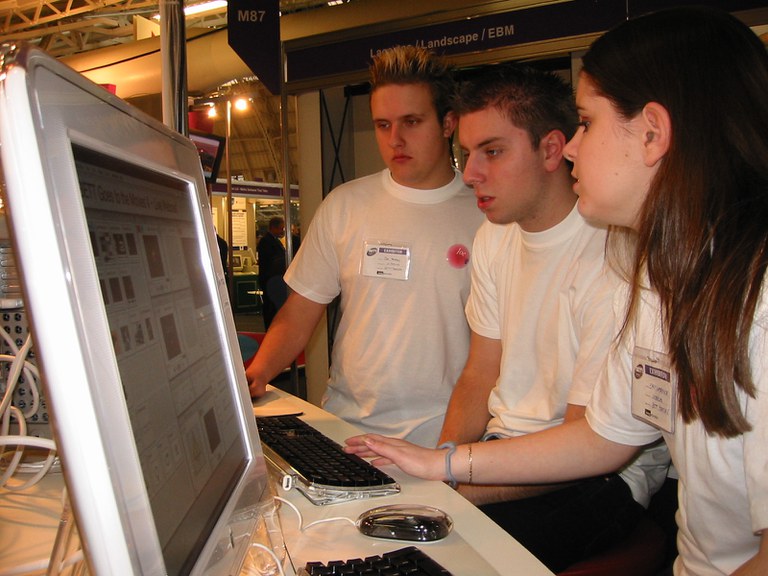
We collaborated with Hedley Walter High School, Brentwood, bringing four students to manage a broadcast studio which attempted to maintain programming to four computers located around the BETT show space.
Here is the plan:
BETT GOES TO THE MOVIES II
8-11 January 2003 • Olympia • London
Feature Area, Grand Hall Gallery Level - next to Seminar Theatre E
Ultralab and Film Education have joined forces for BETT 2003 to demonstrate the possibilities of digital video within educational contexts in a feature sponsored by Apple. Meshing together their own specialities and expertise, the two organisations will demonstrate the potential of digital video (DV) by examining four areas : creativity, composition, performance and content. These areas should not be seen in isolation however, but as part of an interconnected process which will lead to improved standards of teachers’ and students learning through moving image production.
Creativity – everything starts with the idea moving through to its practical realisation through DV. This is not simply giving students a camera and telling them to get on with it. It demands consideration of audiences, message, purpose and constraints as well as a capacity to experiment, innovate and enjoy.
Composition – students (and their teachers) have grown up with tv and film, but need to know how to unlock the aesthetic possibilities of the moving image medium: how shots can be framed; how sequences can effectively be edited together; how sound can enhance images as well as change their meaning. Composition always bears in mind the culture and symbolism of film and the power of sound and image to affect emotion through the grammar already familiar to audiences. The task is to make explicit what is already implicitly understood.
Performance – the finished product can now be broadcast around the world live via the internet or distributed in a number of formats ( CD-ROM, DVD, web page). But the final outcome might not rely only on footage shot by students. For webcasting it could also require additional live material, linking and mixing. Skills of planning, writing and scheduling need to be developed, as well as those of gauging audience reaction and designing interactivity. For the ‘static’ formats, developing interfaces, hypermedia designs and structures to contextualise and navigate DV material provides additional challenge.
Content – learners should be aware of other moving image footage, for example archive and feature film, which can be accessed and which students can use to experiment on a variety of moving image forms such as documentary, news, narrative and non-narrative sequences. Building on such ‘found material’ can help make work on composition and deconstruction the focus within the constraints of school time.
(Words: 495 )
PhD supervisor for Mark Penny
| When |
Feb 01, 2003
to
Dec 31, 2006 |
|---|---|
| Where | Chelmsford |
(Words: 41 )
Fast Track PGCE Brighton
| When | Feb 10, 2003 |
|---|---|
| Where | Brighton |
(Words: 43 )
APU PGCE ICT
| When | Mar 01, 2003 |
|---|
(Words: 39 )
Institute of Education Masters
| When | Mar 04, 2003 |
|---|---|
| Where | London |
Feedback from Norbert Pachler, course tutor:
"Thanks very much once again for your contribution last night. As always, it was very stimulating, informative and thought-provoking as well as greatly valued by students and myself alike. I certainly hope to be able to continue to work together in the future."
Feedback from a student:
"Thank you for getting Richard Millwood to come to the class last night. He's an enthusiastic and inspirational speaker.
His ideas on how computers can enhance creativity were interesting - His N.A.M.Q.C.D.P
His support for using technology in collabrative learning because it allows engagement in complex projects through combining relatively straight forward processes.
Good stuff"
(Words: 148 )
The TUANZ tour
| When |
Mar 15, 2003
to
Mar 29, 2003 |
|---|---|
| Where | New Zealand |
This was in the lead up to establishing Ultralab South, based in Christchurch. It was my first visit to New Zealand and although prestigious, really hard work.
I developed this diagram based on the Maori flag, superimposed with my interpretation of my learning model expression/evaluation. In the end I didn't use it, but it still works for me!
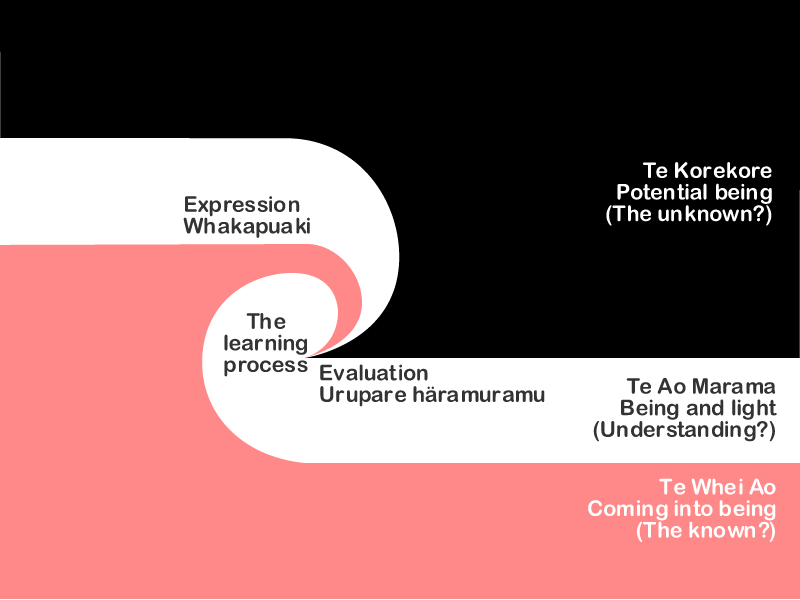
Monday 17th March, Wellington
Tuesday 18th March, Wellington
Wednesday 19th March Wellington
Thursday 20th March, Napier
Friday 21st March Auckland
Saturday 22nd March, Wellington
Sunday 23rd March, Wellington
Monday 24th March, Christchurch
Tuesday 25th March, Christchurch
Wednesday 26th March, Invercargill
Thursday 27th March, Dunedin
Friday 28th March, Christchurch
Saturday 29th March, Singapore
(Words: 2922 )
Becta online Digital Video conference
| When |
Mar 24, 2003
to
Mar 26, 2003 |
|---|---|
| Where | online |
What is the creative challenge represented by digital video and ICT?
Shooting
Editing
Presentation
(Words: 762 )
Apple Teacher Institute 2003
| When |
Apr 07, 2003
to
Apr 11, 2003 |
|---|---|
| Where | Cheltenham |
(Words: 41 )
Nuffield Foundation e-Particpation
| When | Apr 11, 2003 |
|---|---|
| Where | London |
e-Participation seminar
Programme
Questions
Participation
Ultralab established early nineties
- SchoolNet 2000
- Talking Heads
- Notschool.net
- Etui
- Input CBBC
- Characterised by ‘participation and delight’
Can software be harnessed to the real needs?
- new media – more choice about modality, narrative, place and pace
- new tools – discourse, creativity, publication, decision support
- new discourse framing – facilitation, access, software design
- new sense of identity - prejudice, how do I fit in or stand out?
- old tool culture - ICT as a tool is central to human society
(Words: 496 )
Learning Spaces, Virtual Places
| When | Apr 14, 2003 |
|---|---|
| Where | London |
I lead the organisation of this conference, designed the conference programme, print materials and web site. I also edited the post-conference reports and created a web site for that material.This was the invitation post card that I designed:
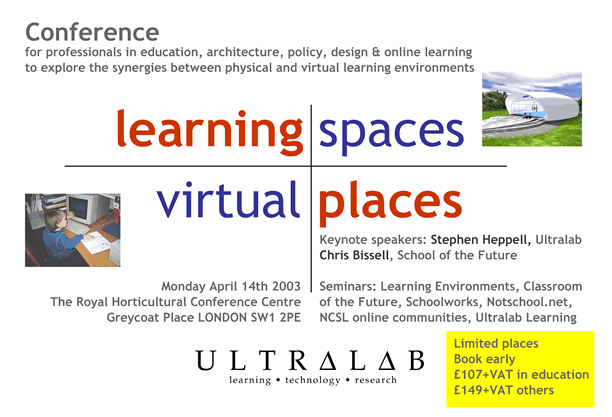
(Words: 89 )
PhD supervisor for Anthony Russell
| When |
Apr 30, 2003
to
Feb 20, 2006 |
|---|---|
| Where | Chelmsford |
(Words: 51 )
UCLES seminar
| When | May 13, 2003 |
|---|---|
| Where | Cambridge |
My short summary:
The 'New Learning Landscape' is to be discovered due to the changes in our human potential which have been brought about with the use of new technologies over the last twenty years. We discover more about human learning in reaction, but there is no room for complacency as the new technology innovation continues. To steer a wise course into the future depends on having a clear view of learners and the processes which shape learning - this talk will discuss a communicative, participative model of learning, establish a critical framework for evaluating new technologies and exemplify these ideas in the context of new media and new tools.
(Words: 162 )
Isle of Man workshop
| When | May 29, 2003 |
|---|---|
| Where | Chelmsford, Essex |
My workshop:
Performance in ICT - Webcasting
Richard Millwood
Ultralab, Thursday May 29th 2003
Aim - to present a five minute schedule of television programming, possibly including such items as a newscast, weather report, advert, location report, chat show, interview - you choose.
You will work in four groups, who need to negotiate with one anothe
|
1 Schedulers Planning what's on and when Negotiating with other groups Strategic management Generating timed events sheet |
2 Studio team Writing words to say Preparing backdrops Rehearsing live presentation Making live presentation |
3 Videographer Filming topical news piece Editing into shape Delivering to producers
|
4 Producers Learning to operate software Practising transitions Operating live camera Integrating recorded footage |
(Words: 198 )
Ayr College Workshop
| When |
Jun 23, 2003
to
Jun 25, 2003 |
|---|---|
| Where | Ayr |
This was the programm:
Monday
09.30-10.00 Introduction
10.00 - 11.00 TWELVE PHOTOS - Caught in the Act
11.20 - 12.30 Showtime
12.30 Lunch
13.30 - 15.00 One Minute Video Stories - Ayr College Soap
15.00 - 15.20 Break
15.20 - 16.00 continue stories
16.00 - 17.00 Showtime
Tuesday
9.30 Creating an Advert 30 second (exact() advert for fragrance - visual, music, no dialogue but slogan (in text) at the end.
10.30 Tea, coffee and scones
12.00 Showtime
12.30 Lunch
13.30 - 15.00 Preparing internet broadcast
15.00 - 15.20 Tea and coffee
15.20 - 16.35 Preparing internet broadcast
16.35 - 16.40 ABC 1 on ayr
16.45 - 16.50 ABC 2 on ayr
16.55 - 17.00 ABC 3 on ayr
Wednesday
9.30 Preparation for BROADCAST
10.00 Pants on Productions ON AIR
10.10 Merge Group ON AIR
10.20 Honeys ON AIR
10.30 Final movie -
Take a mystery CD sound track, add your visual interpretation based on a one the following words:
FEAR • SUSPENSE • AWAKENING • TRIUMPH • PRIDE • LUST • GREED
The task is to be inspired by the music to create a high quality piece, avoiding pastiche, comedy or satire - instead attempting to create a video which is moving or uplifting with a high value photographic or cinematographic feel.
Framing, composition, colour, dynamism, association with the sound track are key elements.
Create a work that you would be proud to exhibit more widely (assuming copyright clearance on the music).
Invent a title and put brief credits on the end.
12.30 Lunch
13.30 - 15.00 Continue with movie
15.00 - 15.20 Tea and coffee
15.20 - 17.00 Final show, discussion and depart :(
(Words: 370 )
Gloucestershire 14-19 conference
| When | Jun 26, 2003 |
|---|---|
| Where | Cheltenham |
(Words: 61 )
Belfast summer school
| When |
Jul 08, 2003
to
Jul 10, 2003 |
|---|---|
| Where | Belfast |
It was tremendously enjoyable and fulfilling, especially when we were told that we had enticed more sustained engagement than usual for such summer holiday activities, especially in the run up to the 12th July.
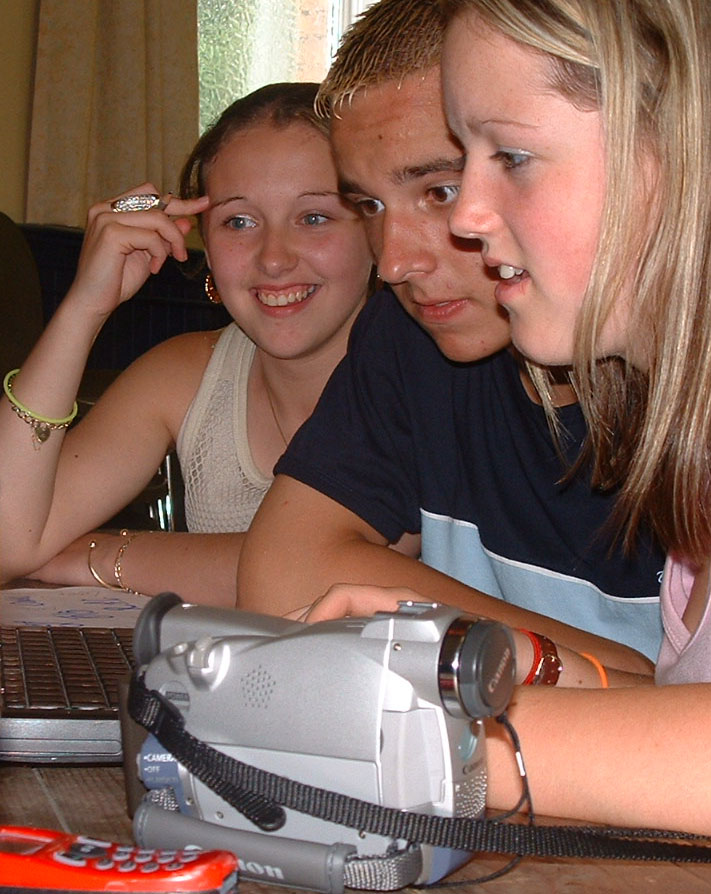
(Words: 106 )
Yorkshire & Humberside Regional Conference
| When | Jul 15, 2003 |
|---|---|
| Where | Ripon |
(Words: 39 )
ITTE '03 Leeds
| When | Jul 22, 2003 |
|---|---|
| Where | Leeds |
We invited the participants in our session to send SMS text messages reflecting on learning spaces they had experienced:
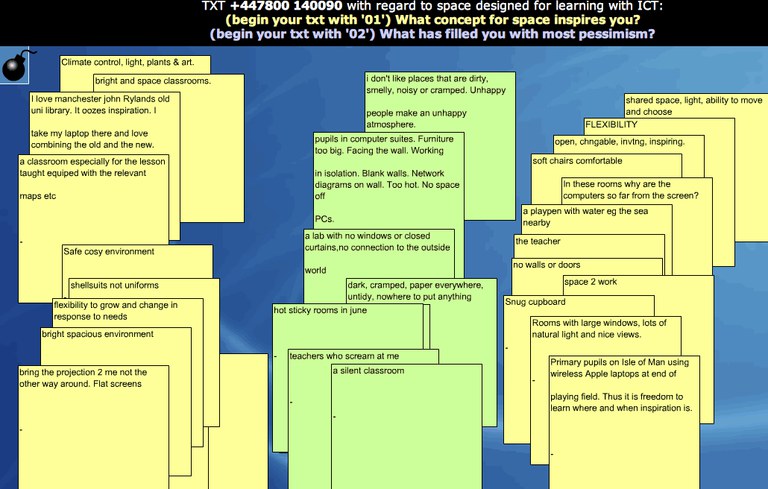
(Words: 66 )
Gloucestershire Post-16 Directors conference
| When | Nov 28, 2003 |
|---|---|
| Where | Cheltenham |
My summary slide:
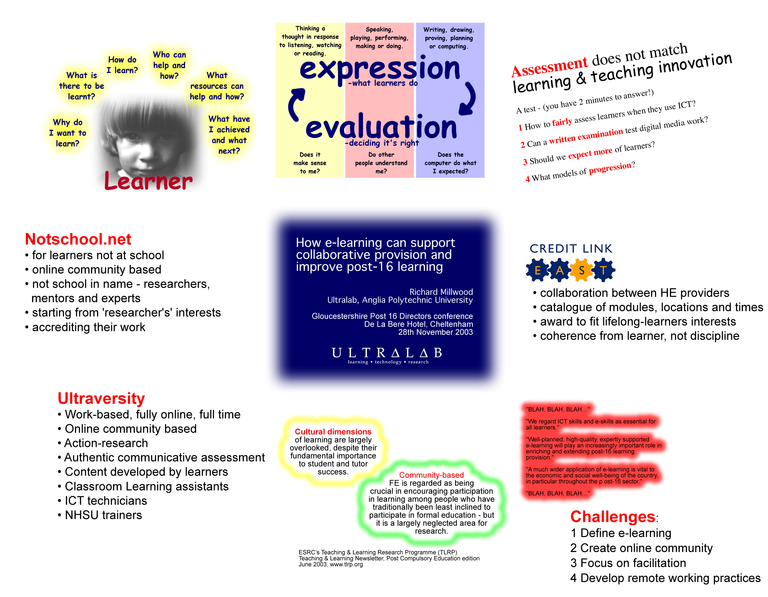
(Words: 44 )
BETT 2004
| When |
Jan 07, 2004
to
Jan 10, 2004 |
|---|---|
| Where | London |

(Words: 63 )
Liverpool Hope University
| When | Jan 12, 2004 |
|---|---|
| Where | Liverpool |
(Words: 18 )
Fast Track PGCE Brighton
| When | Jan 13, 2004 |
|---|---|
| Where | Brighton |
(Words: 22 )
APU mini-conferences
| When |
Jan 19, 2004
to
Jan 20, 2004 |
|---|---|
| Where | Cambridge |
TALK - A Centre for Excellence in Teaching and Learning
HEFCE have invited universities to bid for substantial funds to estsablish specialist centres for excellence in teaching and learning. APU is proposing that Ultralab formulates such a bid and this talk will describe a focus for its aims and objectives and explain and update the current work of Ultralab, including the Ultraversity project.
WORKSHOP - Online learning: what are the essential elements?
Participants will be invited to develop collaboratively a model of essential elements in management, organisation, software and process to support successful online learning. The presenter will contribute those elements which Ultralab have identified through its extensive work in the field.
(Words: 182 )
SITE 2004
| When |
Mar 01, 2004
to
Mar 06, 2004 |
|---|---|
| Where | Atlanta |
This was my statement to introduce my ideas to the participants:
|
I am a Reader from Ultralab, a learning technology research centre of Anglia Polytechnic University in the UK. I have been developing action-research developmental research projects to support learning through technology since 1980. Over these years I have developed simulations, created multimedia resources and architected online community of enquiry for learning. This diagram addresses "(c) the inconsistency of current faculty professional development in the area of information technology;" by pointing out the lack of 'joined up thinking' about the system of education as a whole. Since 1980, the UK government education initiatives have invested in pupils first, teachers second and lecturers, inspectors, civil servants and others last. Teachers are not equipped as of right with laptop or other technologies unlike the humblest secretary in the private sector. Faculty staff are often even less well treated. Likewise, inspectors and civil servants have little in their past experience as a learner to clue them up for decisions affecting current learners and teachers.
|
|
|
|
An example from the early nineties relates to the introduction of CD-ROM technology - schools received free equipment and software, but teacher education institutions were an afterthought. A more recent example from the early 'noughties' is found in the new school building programmes, where local education authority 'model school buildings' do not keep up with new technology and neither does the understanding of the decision-makers involved.
|
This has created an imbalance where those at the base of the education 'food chain' i.e. pupils, are often most familiar and comfortable with technology but have no power, whilst those towards the top e.g. faculty staff, who wield significant power and influence over generations of new teachers, are struggling to find an adequate basis for decision-making due to lack of investment in their cognitive and affective relationship with new technologies. Is this analysis also true in other countries or is it a UK phenomenon? What can be done to overcome this enduring barrier? |
It is my view that significantly more investment in equipment and and continuing professional development for those higher in the education 'food chain' would be appropriate and that all of those areas in the diagram 'thought bubble' need such investment. |
(Words: 446 )
The Research Engaged School
| When | Mar 02, 2004 |
|---|---|
| Where | Chelmsford, Essex |
(Words: 27 )
Cultivating Professional Learning Communities
| When | Mar 03, 2004 |
|---|---|
| Where | Chelmsford, Essex |
My abstract:
Ultralab has over the last ten years developed online learning communities for professional learning and in so doing honed a shared conceptual base to support its philosophy. This presentation is to clarify these concepts and propose them for discussion both in detail and in strategy. Should the university spend time developing and articulating a shared set of concepts which have a moral, intellectual and practical consistency or accommodate a broad church? What are the benefits and costs of doing so?
Summary slide:
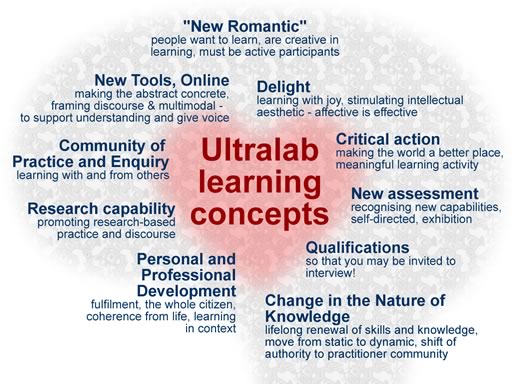
Issues noted arising from discussion:
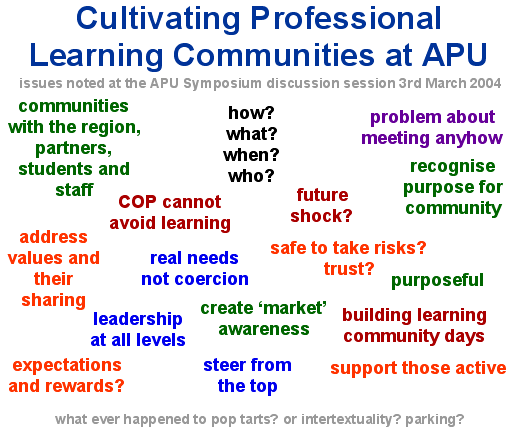
(Words: 138 )
Creating Spaces conference
| When | Mar 27, 2004 |
|---|---|
| Where | Hackney |
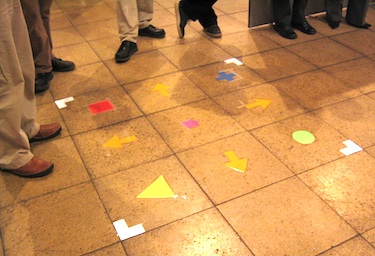
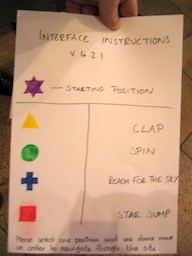
(Words: 44 )
Apple Teacher Institute 2004
| When |
Mar 30, 2004
to
Apr 02, 2004 |
|---|---|
| Where | Cheltenham |
Here is a snapshot from the video I made of Caroline's presentation:
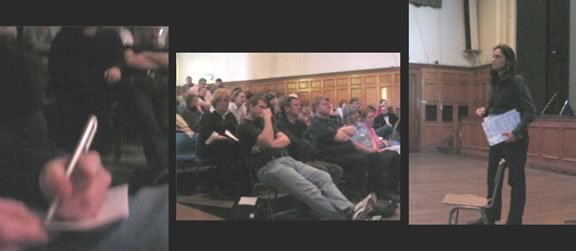
(Words: 92 )

